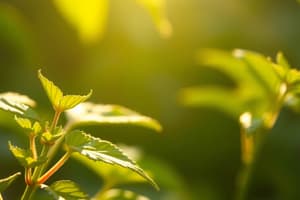Podcast
Questions and Answers
In the light-dependent reactions of photosynthesis, what is the primary role of water molecules?
In the light-dependent reactions of photosynthesis, what is the primary role of water molecules?
- To absorb light energy and transfer it to chlorophyll.
- To be split, releasing oxygen and providing electrons. (correct)
- To transport glucose from the thylakoids to the stroma.
- To directly convert carbon dioxide into glucose.
The Calvin Cycle requires light directly to convert carbon dioxide into glucose.
The Calvin Cycle requires light directly to convert carbon dioxide into glucose.
False (B)
How does the broad and flat structure of a leaf contribute to its efficiency in performing photosynthesis?
How does the broad and flat structure of a leaf contribute to its efficiency in performing photosynthesis?
Increases light absorption
In photosynthesis, __________ regulates gas exchange in the leaf.
In photosynthesis, __________ regulates gas exchange in the leaf.
Match the following factors with their roles in photosynthesis:
Match the following factors with their roles in photosynthesis:
Flashcards
Photosynthesis
Photosynthesis
Process using sunlight to convert CO2 and H2O into glucose and O2.
Photosynthesis Equation
Photosynthesis Equation
6CO2 + 6H2O → C6H12O6 + 6O2
Light-Dependent Reactions
Light-Dependent Reactions
Light energy is absorbed and converted into ATP and NADPH; water is split releasing oxygen.
Calvin Cycle
Calvin Cycle
Signup and view all the flashcards
Limiting Factors of Photosynthesis
Limiting Factors of Photosynthesis
Signup and view all the flashcards
Study Notes
Photosynthesis Definition
- Green plants, algae, and some bacteria convert carbon dioxide (CO₂) and water (H₂O) into glucose (C₆H₁₂O₆) and oxygen (O₂) using sunlight in a process called photosynthesis.
- Photosynthesis produces the oxygen we breathe and forms the base of most food chains.
Photosynthesis Equation
- The balanced chemical equation for photosynthesis is: 6CO₂ + 6H₂O → C₆H₁₂O₆ + 6O₂.
Stages of Photosynthesis
- Photosynthesis occurs in two main stages: light-dependent reactions and the Calvin cycle.
- Light-dependent reactions occur in the thylakoids.
- Chlorophyll absorbs light energy during light-dependent reactions.
- Water molecules split to release oxygen in light-dependent reactions.
- Energy converts into ATP and NADPH during light-dependent reactions.
- The Calvin Cycle (light-independent reactions) occurs in the stroma.
- ATP and NADPH convert CO₂ into glucose during the Calvin cycle.
- The Calvin cycle does not require light but relies on the products of the light-dependent reactions.
Adaptations of the Leaf
- Leaves are specialized for efficient photosynthesis.
- Broad and flat leaves increase light absorption.
- Thin leaf structure shortens the diffusion distance for gases.
- Chloroplasts contain chlorophyll for capturing light energy.
- Stomata regulate gas exchange.
- Veins (xylem & phloem) transport water and glucose.
Limiting Factors
- Light intensity, carbon dioxide concentration, temperature, and water availability influence photosynthesis.
- More light increases photosynthesis up to a point.
- Carbon dioxide concentration is essential for glucose production.
- Enzymes work best at an optimal temperature.
- Water availability is essential for splitting in light-dependent reactions.
Studying That Suits You
Use AI to generate personalized quizzes and flashcards to suit your learning preferences.
Related Documents
Description
Photosynthesis enables green plants, algae, and some bacteria to convert carbon dioxide and water into glucose and oxygen using sunlight. It consists of light-dependent reactions and the Calvin cycle. Light-dependent reactions occur in the thylakoids, while the Calvin cycle occurs in the stroma, converting CO₂ into glucose.




